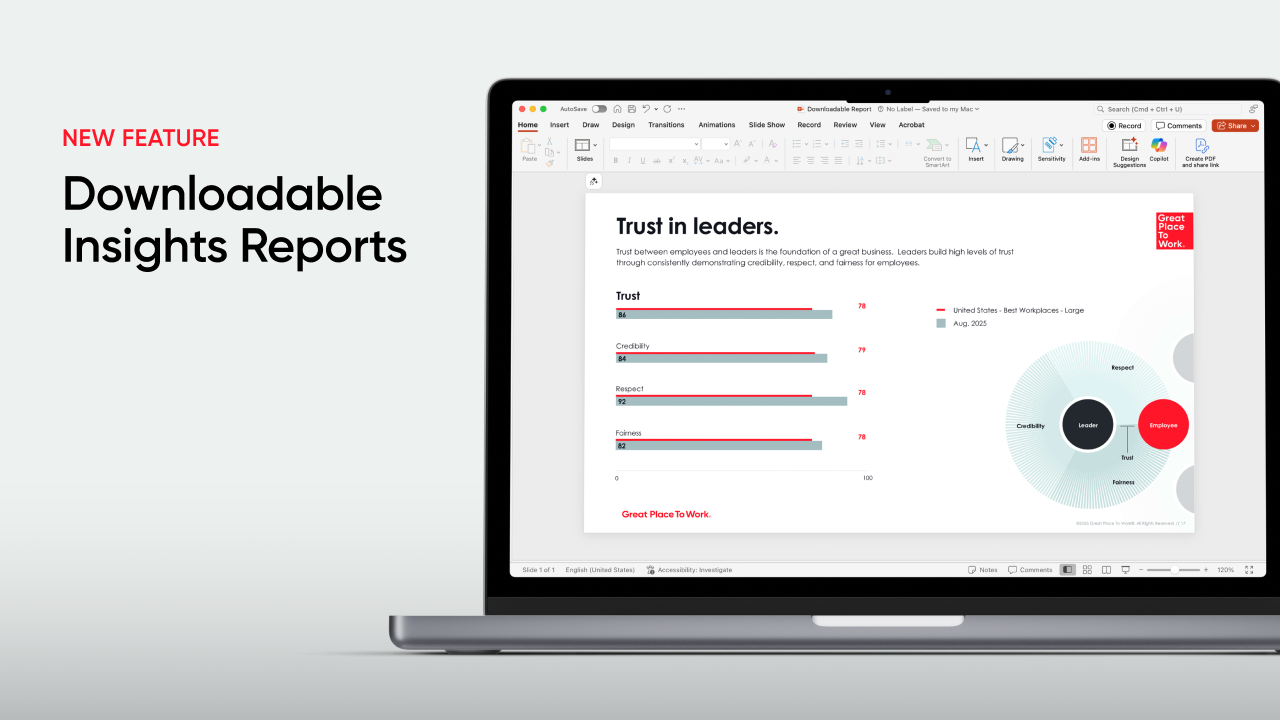
28 November 2017
Childbirth requires time off. Toddlers get colds. Schools close for the holidays. Teens’ activities can overlap with work hours. Challenges like these inform the assumptions employers make about parents’ needs in the workplace. But research from our ranking of the 2017 Best Workplaces for Parents found that employees raising children value their experience in the workplace as well as the pay, benefits, and programs that help them support their families.
Perks like these can make an enormous impact on an individual basis, but their relationship to overall retention is comparatively small. In fact, parents’ assessment of their work-life balance was near the bottom of a list of workplace traits related to plans for a long-term career within a company.
The biggest factors driving employees’ intent to stay varied little between mothers, fathers and their colleagues without children. These included a fun workplace, a sense of making a difference, and pride in the organization, which made mothers 15 times more likely to say they want to work for their employers for a long time.
Surprisingly, work-life balance was a bigger driver of retention for childless men than for employees with kids.
Surveyed mothers were less likely than working women without children at home to say their organizations avoid politics, handle promotions fairly and show appreciation for hard work. Fathers gave their employers slightly lower marks than working men without children at home for benefits and micromanagement. And, while women overall were less likely than men to believe they were paid fairly, this gap became even wider between fathers and mothers specifically.
These distinctions point to management practices that can benefit parents and non-parents alike. Thorough and transparent communication—a key element that underlies fairness—is important for caregivers who might not get wind of corporate developments passed along informally by employees socializing after hours. Especially when co-workers take advantage of flexible scheduling or telecommuting, it’s also important to call out their contributions to the team and keep them top-of-mind during project decisions.
An employee at Crowe Horwath, one of the Best Workplaces for Parents, offered this example: “My boss goes out of his way to make sure I can balance client service and the special health needs of one of my family members. He goes to bat for me to get extra equipment and staff resources when needed to help me balance work-life commitments. It makes it a win-win for client and employee, because there is seamless continuity of service delivery without the disruption and difficulties of extended medical leave.”
In a similar vein, Ernst & Young built a program dedicated specifically to keeping new parents in-the-loop. Mothers and fathers returning from leave can take advantage of coaching focused on the challenging transition into the life of a working parent.
At Allianz, one employee said, “I accepted a promotion offer literally two days before giving birth to my first child. The company supported my promotion, despite the fact that I would be gone for the first three months of my new job.” She added, “They paid me my significantly higher salary the entire 12 weeks I was on leave.”
Families’ needs evolve over time, but our research suggests that parents’ commitment to their work holds steady. The Best Workplaces make the most of parents’ dedication, building their leadership pipeline and retaining talent by investing in and involving employees at all stages of their lives.
The limits of balance
Time off and flexibility tend to be the biggest focus for companies courting job candidates with kids or persuading new parents to stay in the workforce. The median length of paid maternity leave at the Best Workplaces for Parents was 60 days, with 35 days offered to new fathers or secondary caregivers. Eighty-six percent of the leading employers also offered flexible schedules.Perks like these can make an enormous impact on an individual basis, but their relationship to overall retention is comparatively small. In fact, parents’ assessment of their work-life balance was near the bottom of a list of workplace traits related to plans for a long-term career within a company.
The biggest factors driving employees’ intent to stay varied little between mothers, fathers and their colleagues without children. These included a fun workplace, a sense of making a difference, and pride in the organization, which made mothers 15 times more likely to say they want to work for their employers for a long time.
Surprisingly, work-life balance was a bigger driver of retention for childless men than for employees with kids.
The bigger picture for parents
When Great Place To Work analyzed more than 440,000 employee surveys, parents were more likely than their peers to say their work is more than “just a job.” They were also more likely to plan a long-term future with their companies. This dedication benefits employers, although it's accompanied by greater concerns about workplace fairness.Surveyed mothers were less likely than working women without children at home to say their organizations avoid politics, handle promotions fairly and show appreciation for hard work. Fathers gave their employers slightly lower marks than working men without children at home for benefits and micromanagement. And, while women overall were less likely than men to believe they were paid fairly, this gap became even wider between fathers and mothers specifically.
These distinctions point to management practices that can benefit parents and non-parents alike. Thorough and transparent communication—a key element that underlies fairness—is important for caregivers who might not get wind of corporate developments passed along informally by employees socializing after hours. Especially when co-workers take advantage of flexible scheduling or telecommuting, it’s also important to call out their contributions to the team and keep them top-of-mind during project decisions.
An employee at Crowe Horwath, one of the Best Workplaces for Parents, offered this example: “My boss goes out of his way to make sure I can balance client service and the special health needs of one of my family members. He goes to bat for me to get extra equipment and staff resources when needed to help me balance work-life commitments. It makes it a win-win for client and employee, because there is seamless continuity of service delivery without the disruption and difficulties of extended medical leave.”
In a similar vein, Ernst & Young built a program dedicated specifically to keeping new parents in-the-loop. Mothers and fathers returning from leave can take advantage of coaching focused on the challenging transition into the life of a working parent.
At Allianz, one employee said, “I accepted a promotion offer literally two days before giving birth to my first child. The company supported my promotion, despite the fact that I would be gone for the first three months of my new job.” She added, “They paid me my significantly higher salary the entire 12 weeks I was on leave.”
Families’ needs evolve over time, but our research suggests that parents’ commitment to their work holds steady. The Best Workplaces make the most of parents’ dedication, building their leadership pipeline and retaining talent by investing in and involving employees at all stages of their lives.







